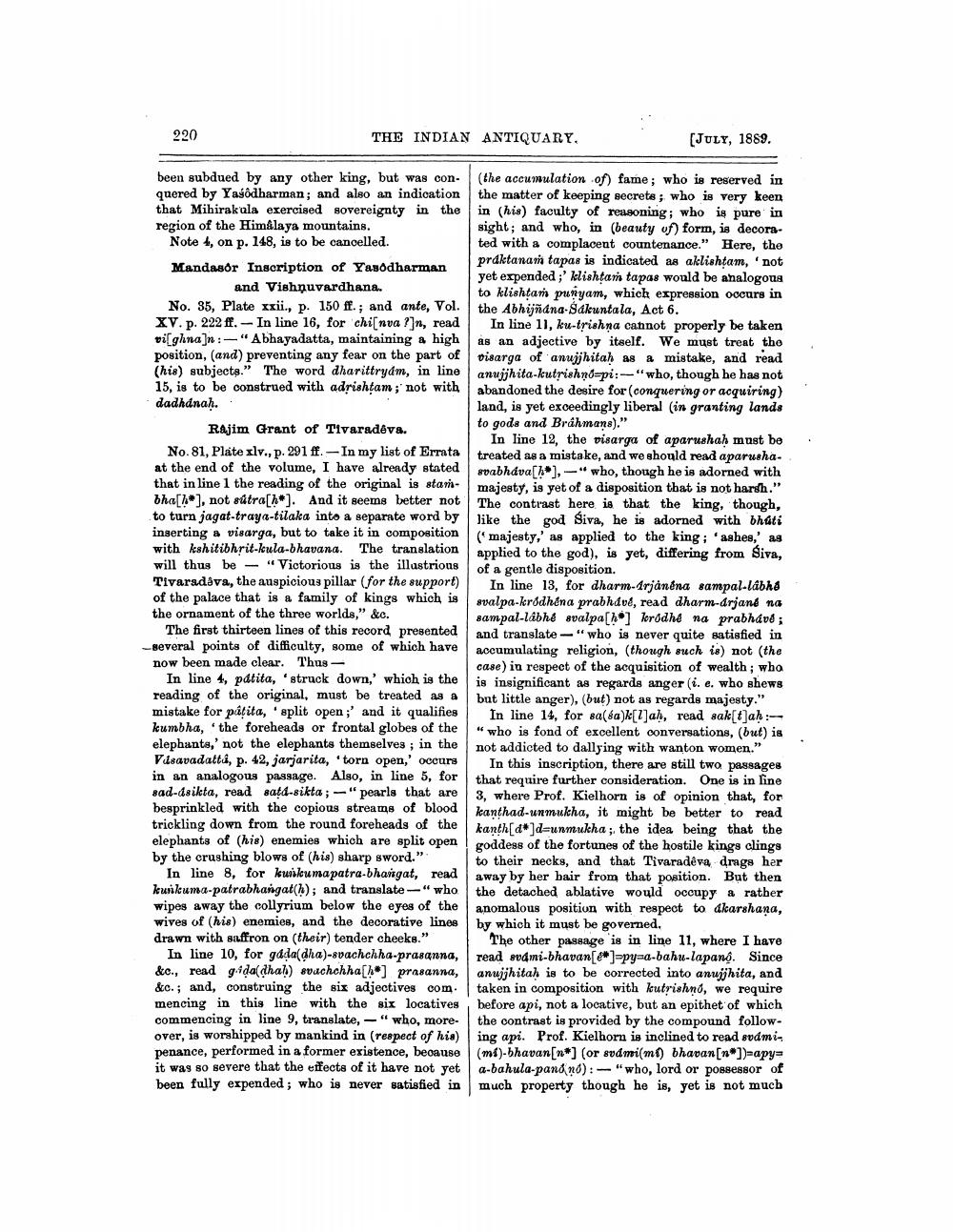________________
220
THE INDIAN ANTIQUARY.
been subdued by any other king, but was conquered by Yasodharman; and also an indication that Mihirakula exercised sovereignty in the region of the Himalaya mountains. Note 4, on p. 148, is to be cancelled.
Mandasor Inscription of Yasodharman and Vishnuvardhana.
No. 35, Plate xxii., p. 150 ff.; and ante, Vol. XV. p. 222 ff. In line 16, for chi[nva ?]n, read vighna]n:-"Abhayadatta, maintaining a high position, (and) preventing any fear on the part of (his) subjects." The word dharittrydm, in line 15, is to be construed with adrishtam; not with dadhanaḥ.
Rajim Grant of Tivaradeva.
No. 81, Plate xlv., p. 291 ff.-In my list of Errata at the end of the volume, I have already stated that in line 1 the reading of the original is stambha[*], not sûtra[*]. And it seems better not to turn jagat-traya-tilaka into a separate word by inserting a visarga, but to take it in composition with kshitibhrit-kula-bhavana. The translation will thus be "Victorious is the illustrious Tivaradiva, the auspicious pillar (for the support) of the palace that is a family of kings which is the ornament of the three worlds," &c.
The first thirteen lines of this record presented -several points of difficulty, some of which have now been made clear. Thus -
In line 4, patita, struck down,' which is the reading of the original, must be treated as a mistake for patita, split open; and it qualifies kumbha, the foreheads or frontal globes of the elephants,' not the elephants themselves; in the Visavadattá, p. 42, jarjarita, torn open,' occurs in an analogous passage. Also, in line 5, for sad-dsikta, read satd-sikta; -"pearls that are besprinkled with the copious streams of blood trickling down from the round foreheads of the elephants of (his) enemies which are split open by the crushing blows of (his) sharp sword."
In line 8, for kunkumapatra-bhangat, read kunkuma-patrabhangat(h); and translate-"who wipes away the collyrium below the eyes of the wives of (his) enemies, and the decorative lines drawn with saffron on (their) tender cheeks."
In line 10, for gada(dha)-svachchha-prasanna, &c., read giḍadhah) svachchha[*] prasanna, &c.; and, construing the six adjectives com. mencing in this line with the six locatives commencing in line 9, translate," who, moreover, is worshipped by mankind in (respect of his) penance, performed in a former existence, because it was so severe that the effects of it have not yet been fully expended; who is never satisfied in
[JULY, 1889.
(the accumulation of) fame; who is reserved in the matter of keeping secrets; who is very keen in (his) faculty of reasoning; who is pure in sight; and who, in (beauty of) form, is decorated with a complacent countenance." Here, the praktanam tapas is indicated as aklishṭam, 'not yet expended;' klishṭam tapas would be analogous to klishtam punyam, which expression occurs in the Abhijñána-Sakuntala, Act 6.
In line 11, ku-trishna cannot properly be taken as an adjective by itself. We must treat the visarga of anujjhitaḥ as a mistake, and read anujjhita-kutrishno-pi:-"who, though he has not abandoned the desire for (conquering or acquiring) land, is yet exceedingly liberal (in granting lands to gods and Brahmans)."
In line 12, the visarga of aparushaḥ must be treated as a mistake, and we should read aparusha. svabháva [h]," who, though he is adorned with majesty, is yet of a disposition that is not harsh." The contrast here is that the king, though, like the god Siva, he is adorned with bhati (majesty,' as applied to the king; ashes,' as applied to the god), is yet, differing from Śiva, of a gentle disposition.
In line 13, for dharm-Arjánéna sampal-lábhé svalpa-kródhéna prabhávé, read dharm-drjané na sampal-lábhé svalpa [h] kródhé na prabhávé; and translate-"who is never quite satisfied in accumulating religion, (though such is) not (the case) in respect of the acquisition of wealth; who is insignificant as regards anger (i. e. who shews but little anger), (but) not as regards majesty."
In line 14, for sa(sa)k[1]ah, read sak[t]aḥ:-- "who is fond of excellent conversations, (but) is not addicted to dallying with wanton women."
In this inscription, there are still two passages that require further consideration. One is in line 3, where Prof. Kielhorn is of opinion that, for kanthad-unmukha, it might be better to read kanth[d*]d-unmukha;, the idea being that the goddess of the fortunes of the hostile kings clings to their necks, and that Tivaradêva drags her away by her hair from that position. But then the detached ablative would occupy a rather anomalous position with respect to akarshana, by which it must be governed.
The other passage is in line 11, where I have read svami-bhavan[*]-py-a-bahu-lapans. Since anujjhitaḥ is to be corrected into anujjhita, and taken in composition with kutrishno, we require before api, not a locative, but an epithet of which the contrast is provided by the compound following api. Prof. Kielhorn is inclined to read svámi(ms)-bhavan[n] (or svámi(m) bhavan[n*])=apy= a-bahula-pandnd): "who, lord or possessor of much property though he is, yet is not much




